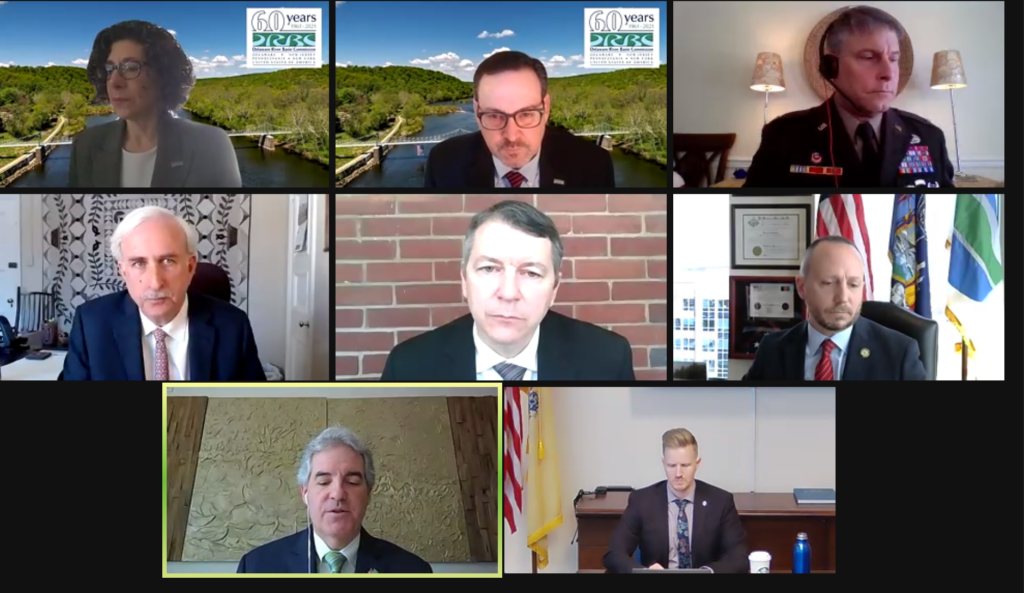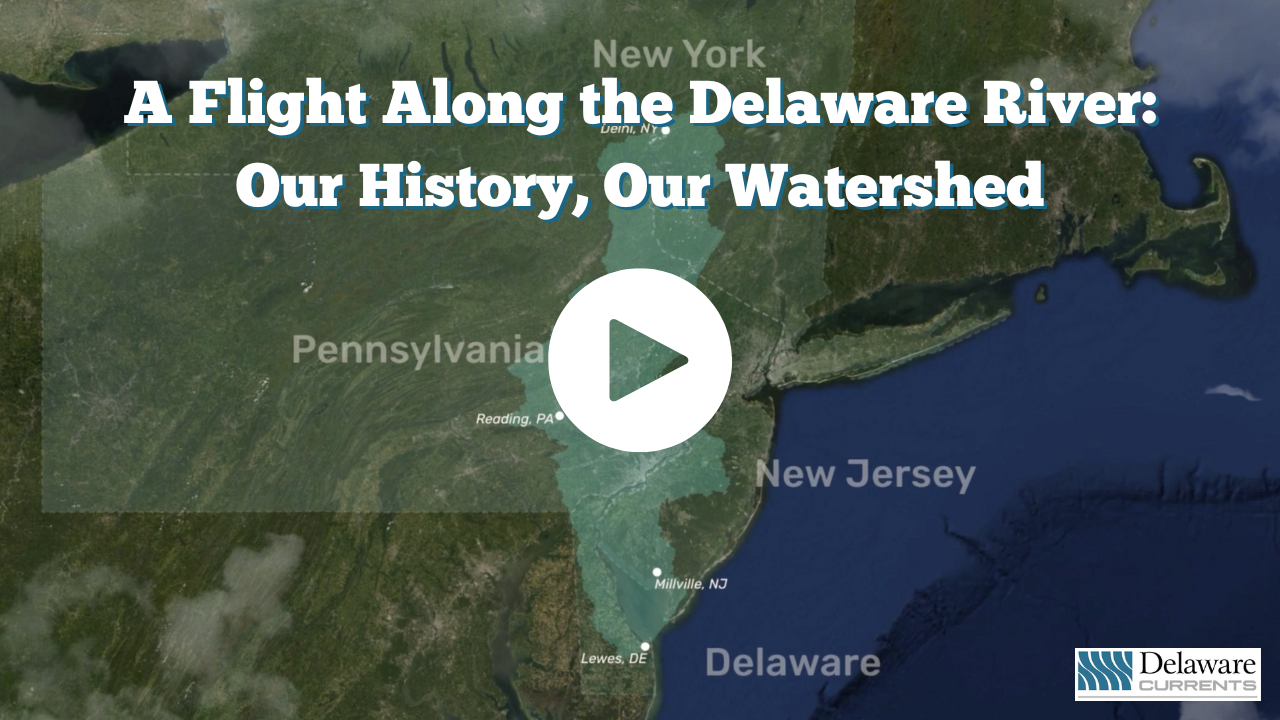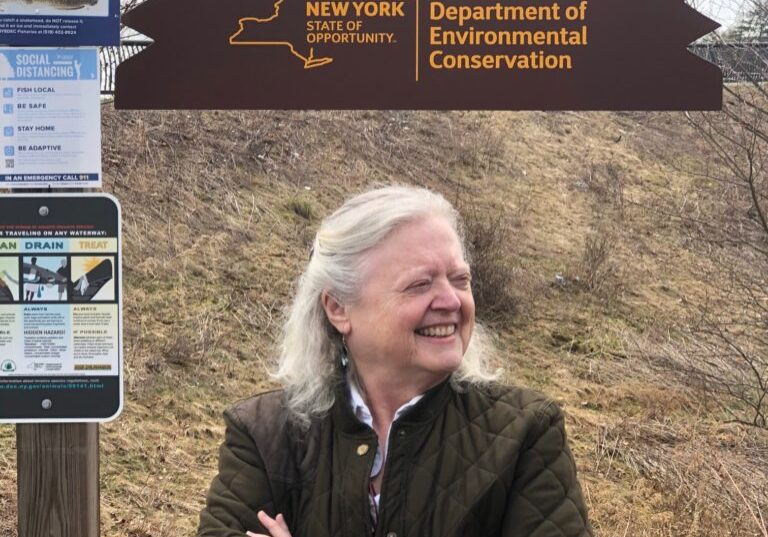
Fracking ban approved
| February 25, 2021
Fracking is banned in the Delaware River watershed.
In a majority vote, the resolution to ban fracking was approved by the representatives of all of the basin states: New York, New Jersey, Pennsylvania and Delaware. The only abstention was from the representative of the U.S. government, Brigadier General Thomas J. Tickner, U.S.A.C.E., indicating that there wasn’t enough time to confer with the incoming Biden administration.
Here’s that resolution.
In previous discussions of fracking, there have been three resolutions. The first of those concerning fracking was dealt with today.
The other two, concerning the import of fracking wastewater to the basin, or the export of water for fracking purposes, essentially disappeared today, replaced with the commissioners directing DRBC Executive Director Steve Tambini to develop rules for both the import and export of water.
Here’s that resolution.
But, importantly, these new rules for water imports and exports seem not to be focused on fracked water use, but rather on importing to or exporting from the basin in order to provide water for the health of the residents of adjacent or overlapping watersheds, not for use by fracking.
The vote today makes concrete what has been called a de facto moratorium on fracking in the basin since 2010, when the commission began a process to develop rules about fracking in the watershed that were never voted on. The process re-started in 2017 with the development of these three resolutions.
In some ways the fracking ban was not seriously in question since all four Democratic governors have expressed support for the ban. (Remember, it’s the governors who are the commissioners.)
Today, almost all the commissioners were represented by the various heads of their state environmental departments, as if recognizing the importance of the vote.
Usually it’s a second or third alternate.
Attention will now focus on those resolutions yet to be developed. For now the threat of water coming from fracking processes, as well as water being exported for those processes, seems to have abated. But the DRBC moves slowly and though that’s the conclusion that could be reached from reading the tea leaves, it won’t be done until those rules are promulgated, open for public hearings and eventually a vote by the commissioners.
For comments from the participants, see this DRBC press release.
Members of the environmental community that have been persistent in opposing fracking also had comments, from a press release:
“This is a powerful moment; our watershed Governors and the President listened to the people and honored their commitments to protect us from the devastations of fracking in our watershed. To all the people who said we should accept the regulatory proposal that banned fracking but still sacrifice our watershed to the toxic frack wastewater and water exports I say never underestimate the power of the people. We clearly still have further to go, the ban on the actual fracking is irreplaceably important but we also need a permanent ban that prevents the fracking industry from using our watershed as the dumping ground for its toxic waste, and that prohibits it from sapping our precious waters to be used to sacrifice others to the fracking industry. Governor Murphy, Governor Carney and Governor Wolf promised to protect our watershed from all aspects of the fracking industry, we are going to hold them to that promise and will urge Governor Cuomo and President Biden to also step up and protect the present and future generations of our region by also ensuring complete and enduring protections from all aspects of fracking including its toxic wastewater and water withdrawals. But as of today, this is a major victory! And we are so very grateful to our 4 watershed governors — Murphy, Cuomo, Wolf and Carney — and the President for their proactive and protective decision today!” said Maya van Rossum, the Delaware Riverkeeper and leader of the Delaware Riverkeeper Network.
“Today’s vote is a historic victory for all the people who call the Delaware River Basin home and drink the clean water that flows from the Catskills to the Delaware Bay. No longer will they face the threats of water pollution, air pollution, and the disease that comes with fracking. As the Delaware River Basin Commission advances regulations regarding fracking wastes and water withdrawals, we will fight to ban those activities as well; the best way to protect the Basin against fracking’s impacts is to prevent them. Catskill Mountainkeeper has been fighting for this day for over a decade, and we’re not alone. We’ve been fighting alongside tens of thousands of individuals, and hundreds of organizations to keep the dirty, dangerous oil and gas industry out of the Basin. These advocates have persevered against long odds and shown up in every way–at hundreds of community meetings, hearings, rallies, canoe protests, and in four state capitals to make today a reality,” said Wes Gillingham, Associate Director, Catskill Mountainkeeper.
“The Commissioners listened to the people and to the science in making this historic move. We thank them for taking a stand to protect the basin from unconventional drilling and the practices surrounding it,” said Karen Feridun, Founder, Berks Gas Truth in Pennsylvania.
“In a win to protect the Delaware River, the DRBC voted to ban fracking. This historic vote means that fracking can no longer take place in the Basin. This ban will protect the drinking water for 15 million people and thousands of acres of forest from fracking wells. It also means that there won’t be pipelines built to take that gas to the market, protecting even more land and water. This is the first step towards a full ban,” said Jeff Tittel, Director of the New Jersey Sierra Club. “Today they took an important step forward, and we are glad that they have committed to a full ban. We’ll be glad to work with them to do additional rules to ban the treatment and dumping of fracking wastewater in the Basin or taking water for fracking elsewhere. This will help protect public health and the River from more contamination.”
“This has been an epic battle engaged by a huge, diverse, well-informed and united watershed community. The outcome is historic because the Delaware River Watershed is preventing pollution and degradation by their forthright precautionary action to ban fracking and begin the next step towards a full ban by the adoption of regulations that will ban the import of wastewater from fracking and the export of water to fuel fracking’s destruction elsewhere. These next steps put us on the road to a full and powerful defense against the toxic and radioactive pollution that inextricably comes with fracking and allows the Delaware to provide clean drinking water to 17 million people who rely on the river’s flows. We will fully engage in the coming months in the rulemaking process to achieve a full ban on fracking for the sake of all our communities, human and nonhuman,” said Tracy Carluccio, Deputy Director, Delaware Riverkeeper Network.
“The Commission’s decision to keep dirty fracking operations out of the region is a decade in the making, and represents a major victory for the grassroots anti-fracking movement and everyone who depends on the Delaware River for their drinking water,” said Eric Weltman, New York-based Senior Organizer with Food & Water Watch.
“The fracking ban in the Delaware River Basin is a momentous victory for public health, the environment, and against climate change,” said Kimberly Ong, Senior Attorney at NRDC (Natural Resources Defense Council). “The Basin supplies drinking water to millions of people, and adopting a ban on harmful fracking-related activities is necessary to further protect the health of the communities and the watershed.”
“We thank the Governors for fulfilling their promise to protect the Delaware River Basin and all those who depend on a clean river for the health of their families, their environment and their jobs,” said Coralie Pryde, League of Women Voters of Delaware.
B. Arrindell, Director of Damascus Citizens for Sustainability responded to the DRBC banning frack drilling and arranging to ban the import of frack waste into the Basin and the export of water for fracking elsewhere, by saying that, “We’re so glad that the DRBC is fulfilling its reason for existence – protecting the the Basin from contamination. Frack drilling and related waste create permanent pollution and impact human and environmental health – impacts that the Basin will avoid with this precautionary move. DCS is proud of the governors that voted for this.”
“Today’s ban on fracking in the Delaware River basin is a huge deal, and a testament to the persistence and dedication of grassroots activists in a battle that has lasted over a decade,” said Eric Benson, NJ Campaigns Director, Clean Water Action. “The full and total fracking ban, especially the import and export of water for fracking, makes our four states and the Biden Administration leaders in following climate science, rejects a dirty and dangerous drilling process, and prioritizes the need for protecting drinking water for 17 million people over corporate profits. This is a key sign of changing winds, with more full and total frack bans to come in more states, regions and watersheds across the United States.”
“This is a great day for the Delaware River watershed and in the fight to protect our precious drinking water resources from the full impacts of fracking and its waste. This means the threat of fracking won’t shed its footprint on the national treasure that is the Delaware River watershed,” said Doug O’Malley, director of Environment New Jersey. “This is the culmination of more than a decade of work to fully ban fracking and its waste from the watershed and the actions today will lead to full permanent protections to the watershed and the 15 million people who receive drinking water from the watershed. We look forward to working on the final set of rules to ban all fracking activities in the watershed but the message from DRBC today is clear — fracking and its activities pollute our precious watershed and should have no place in it. This is a massive victory for the public and hundreds of thousands of citizens who called for the DRBC to act over the last decade. We thank Governor Murphy for calling for this exact action more than two years ago and all the Governors who stood up for the watershed.”
Another commentator not on the previous press release,
“Today’s ban on fracking is a victory for local community health, our national parks, and the 15 million people who depend on the Delaware River for clean drinking water, swimming, boating and fishing. The number of visitors at parks along the Delaware River, notably at Delaware Water Gap National Recreation Area, has skyrocketed as the pandemic stretches on. More people are getting outside at our parks, and they deserve safe access and clean water.
“This river is more than a tourist destination; it’s the economic lifeblood for many surrounding communities and local businesses. In 2019, Delaware Water Gap and the Upper Delaware Scenic & Recreational River welcomed more than 3 million visitors, whose spending in the area generated nearly $130 million in economic activity. It is imperative that we protect our parks, our resources, and the people who love and depend on them from the devastating environmental impacts of fracking.
“For years, the National Parks Conservation Association has opposed fracking in the Delaware River basin It’s heartening to see leaders in Pennsylvania, New Jersey, New York and Delaware join forces to preserve this important watershed.” Halle Van der Gaag, Senior Manager for Pennsylvania and Delaware Programs for the National Parks Conservation Association


![DC_Image [Image 4_Assunpink Meets Delaware] meets Delaware The Assunpink Creek on its its way to meet the Delaware River. The creek passes through woods, industrial and commercial areas and spots both sparkling and filled with litter.](https://delawarecurrents.org/wp-content/uploads/bb-plugin/cache/DC_Image-4_Assunpink-meets-Delaware-1024x768-landscape-14f069364113da5e8c145e04c9f2367c-.jpg)



